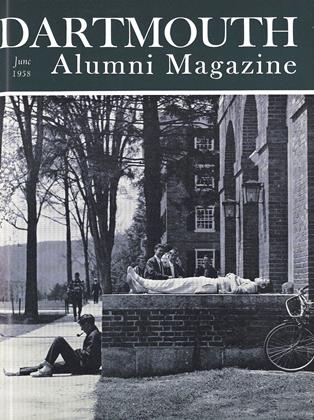AT a gesture from Henry Williams, the lights in the Little Theatre dimmed and a hush fell over the audience. The footlights brought the austere scenery into sharp relief as the Chorus of wizened Greek patriarchs walked slowly on to the stage and thundered out their pronouncements:
Numberless are the world's wonders, but none, More wonderful than man; the storm gray sea Yields to his prows, the huge crests bear him high; Earth, holy and inexhaustible, is graven With shining furrows where his plows have gone....
And so the final tragedy of the beleaguered princess and a king's terrible struggle with his soul began to unwind as the ringing poetry of Sophocles stirred the capacity crowd.
With the final curtain call of Antigone on Sunday evening, April 20, an unusual educational experience in the integration of the arts was in the process of being created by Dartmouth's Great Issues Course. Several weeks later, Harvard's Eric Havelock spoke on "Antigone: the Problem of Conscience," culminating the concluding series of Great Issues lectures on the problem of Personal Values for Modern Man. Seniors, who were required to make journal comments on the play as well as the lectures, were encouraged to be articulate in describing their reactions to the underlying theme of the final quarter, Conscience, as it was presented in the different forms of exposition.
This was the first time that an educational experiment of this type was attempted by the Great Issues Course, and the results appear to have been gratifying. Those seniors who were in both the course and the play were rewarded by private sessions and informal discussions with the speakers following the regular Monday evening lecture. A small exhibit concerning the technical production of the play itself was assembled in the Public Affairs Laboratory earlier and examined the drama from still another aspect.
The program was organized and carried out by the Great Issues Steering Committee, under the chairmanship of Professor James F. Cusick. The success of this initial experiment in the integration of the arts gives promise of similar programs in the future.
Phyllis Warfel, wife of The Players' technical director, in the role of Antigone.
Antigone defends the Tightness of her actions before King Creon, played by Robert L. Caulfield '60.
The chorus of old men of Thebes before the palace of Creon.
 View Full Issue
View Full Issue
More From This Issue
-
 Feature
FeatureTHE GOALS of a Business Society
June 1958 By ALBERT NICKERSON, -
 Feature
FeatureMUSIC FESTIVAL
June 1958 By GEORGE O'CONNELL -
 Feature
FeatureMAY: It's Marvelous
June 1958 -
 Class Notes
Class Notes1918
June 1958 By ERNEST H. EARLEY, RICHARD A. HOLTON -
 Class Notes
Class Notes1910
June 1958 By RUSSELL D. MEREDITH, ANDREW J. SCARLETT, HERB WOLFF '10 -
 Class Notes
Class Notes1911
June 1958 By NATHANIEL G. BURLEIGH, JOSHUA B. CLARK
Features
-
 Feature
FeatureJUST LIKE THE REST OF US
November 1976 By A. KELLEY FEAD -
 Feature
FeatureThe Secret Art of Dr. Seuss
Mar/Apr 2013 By CAROLINE SMITH -
 Cover Story
Cover StoryHOW TO RAISE HAPPY KIDS
Jan/Feb 2009 By CHRISTINE CARTER '94 -
 Features
FeaturesEarly Innings
MAY | JUNE 2025 By Emma Joyce -
 Feature
FeatureFor The Sake Of Argument
February 1993 By Jay Heinrichs -
 Feature
FeatureNervi's Concrete Aesthetic
January 1976 By JOHN JACOBUS


